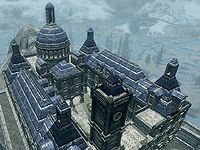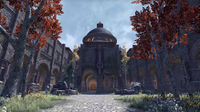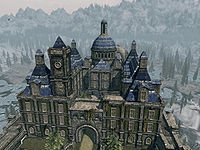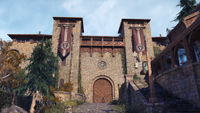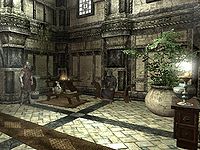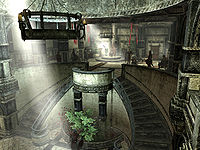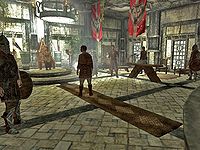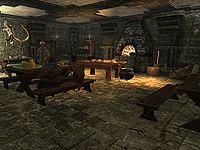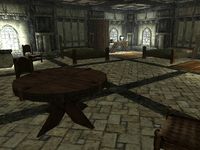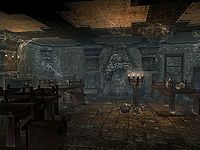Lore:Blue Palace
| Blue Palace | |
|---|---|
| Type | Castle |
| Continent | Tamriel |
| Province | Skyrim |
| Hold | Haafingar |
| Settlement | Solitude |
| Appears in | Arena, Skyrim, Online |
The Blue Palace (also called Castle Solitude)[1] is a large castle found on the eastern end of the city of Solitude. It is the seat of power in Haafingar Hold, where the Jarls of Solitude and even the High Kings of Skyrim occupy its grandiose and stately halls. The northeast wing contains the Jarl and their court's living quarters, while the southwest wing, known as the Pelagius Wing, is in a mass state of disrepair and avoided since the death of the eponymous Mad King of Solitude.[2] The Imperial Gardens in the palace courtyard contains a formal and motley assortment of various regional flora like thistle branches and Douad shrubs.[3]
History[edit]
First – Second Eras[edit]
The Blue Palace was built sometime before 1E 143. As the city expanded across the Great Arch, the Avenues District was one of the last places built in the city, and it all culminated into the Blue Palace, which is right on the tip of the arch, directly above the Karth River. It later became the seat of power after the consolidation of Skyrim in the midst of High King Harald's ascension to the throne.[4] Before then, the Jarls of Haafingar ruled from the Emperor's Tower, the citadel of Castle Dour atop of the hill in Solitude.[2]
In the late First Era, the people of Solitude laid siege against the Blue Palace, at the time occupied by High Queen "Head-Rolling" Roleke, who killed over twenty rebels in less than five minutes. In that siege, Roleke was murdered in battle by her several children, who in turn died from their injuries. With no one else to rule, Irthvyd of a long-forgotten hold was named the new King of Solitude, with blessings from Kyne herself. Years later, Alldimar became the leader of Solitude and during his reign, suspicious accidents took place all over the city, and servants in the Blue Palace would hear strange chanting in the high king's quarters. After his death, the truth had been revealed when a secret compartment in his room had every skull of every victim in the past year. To this day, no one knows what Alldimar's intentions were for the collection but ever since then, he earned the moniker, "Ghostmaker".[5]
When High King Svartr ruled over Solitude and the Kingdom of Western Skyrim, a royal delegation sent by the Warrior-Poet Vivec traveled to the Blue Palace and presented the King with a table string now known as Jarlsbane. But because the court musicians denounced its sound, it sat in the Blue Palace for many years as a curiosity until it was discovered by the Master Bard of House Redoran, Endroni Selvilo and later donated to the Bards College by High King Svargrim.[6]
By the mid-sixth century of the Second Era, the Blue Palace was occupied by High King Svargrim and High Queen Gerhyld, until the latter was assassinated by the Gray Host in 2E 582.[7] The tragedy was the start of a series of events that threatened Western Skyrim as a whole. Princess Svana, along with Lyris Titanborn, Fennorian of House Ravenwatch, and an adventurer would meet in the Blue Palace to discuss their plans against the Gray Host until the attack on Solitude.[8] The ceremony after their victory was held in the Blue Palace's courtyard and it had High King Jorunn in attendance.[9]
Third – Fourth Eras[edit]
In 3E 81, the elderly King Mantiarco marries Potema Septim of the Third Empire, who took residence in the Blue Palace. On several occasions, her mother, Dowager-Empress Quintilla visited the Blue Palace and was known to have frequently strolled through the Imperial Gardens.[10] Eventually, the King passes away and their son, Uriel III becomes the King of Solitude and rules jointly with his mother. Throughout the years, Wolf-Queen Potema invited various diplomats and political figures across the Empire's northern tier, from other kingdoms in Skyrim and nations in High Rock and Morrowind. As time went on, the years of negotiation and intermingling culminated into the War of the Red Diamond in 3E 121. The conflict ended in favor of the Third Empire in 3E 137, after a month-long siege on the Blue Palace. The Wolf-Queen died in the palace and it was burned to the ground. Even when it was rebuilt, according to local myth, her spirit is infused within the castle and drives its ruler into madness.[1][11]:421
It is one of the several theories that explain the madness of King Pelagius Septim III. King Pelagius ruled after his aunt's death, by the order of his father, then King Magnus Septim.[1] He was infamous for his eccentric behavior and strange outbursts. He moved from the throne of Solitude to become the Emperor of Tamriel in 3E 145. His sister, Jolethe took his place as the Queen of Solitude.[12] Ever since his death in 3E 153, another myth is that his spirit haunts the southwest wing and ever since then, the Pelagius Wing has been abandoned, as far as 4E 201.[2] During the Imperial Simulacrum in the late Third Era, the Solitude Palace was occupied by Queen Hania, who would often give out quests to any adventurer that approached her court.[13]
By the third century of the Fourth Era, the Blue Palace was occupied by the Regent Jarl of Solitude, Elisif the Fair.[14] At the time, she was in possession of a Stone of Barenziah, which was later stolen by the Thieves Guild, who in turn re-assembled the crown it belonged to.[15] An adventurer entered the Pelagius Wing after they were tipped off by a madman looking for his master. Unbeknownst to the rest of the palace, the adventurer emerged from the abandoned wing with the Wabbajack.[16]
Gallery[edit]
Notes[edit]
- The Blue Palace has a hereditary office called the "Royal Cheesemonger". They go under a strict inspection of the milk imported into the city, determining which barrel is deemed worthy to make Solitude Eidar, the city's signature cheese. They are extremely rare and are preserved in the vaults underneath the city. This office was instated by Jarl Svartr, who entered office in 2E 431.[17]
See Also[edit]
- For game-specific information, see the Skyrim and Elder Scrolls Online
 articles.
articles.
References[edit]
- ^ a b c Biography of the Wolf Queen — Katar Eriphanes
- ^ a b c Walking the World, Vol XI — Spatior Munius
- ^ The Wolf Queen, v3 — Waughin Jarth
- ^ Pocket Guide to the Empire, 1st Edition: Skyrim — Imperial Geographical Society, 2E 864
- ^ Scandals of Solitude's Royalty — Erisa Sylbenitte of the Coterie of Organized Scholars
- ^ Jarlsbane
- ^ Dark Clouds Over Solitude story quest in ESO: Greymoor
- ^ The Gray Host story quest in ESO: Greymoor
- ^ Daughter of the Wolf story quest in ESO: Greymoor
- ^ The Wolf Queen, v6 — Waughin Jarth
- ^ The Elder Scrolls V: Skyrim: Prima Official Game Guide — David Hodgson
- ^ The Madness of Pelagius — Tsathenes
- ^ Palaces sub-location in Arena
- ^ Blue Palace sub-location in Skyrim
- ^ No Stone Unturned faction quest in Skyrim
- ^ The Mind of Madness daedric quest in Skyrim
- ^ Cheeses of Skyrim: Hjaalmarch, Haafingar — B.
